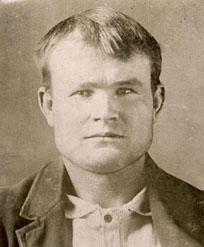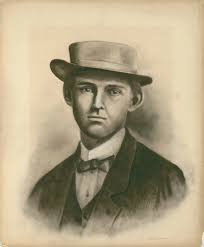Sam Bass

Sam Bass rode quietly under the pale Texas moon, his hat pulled low over his youthful face. It was the summer of 1878, and at just twenty-seven, Bass had become one of the most infamous and daring outlaws of the West. His reputation had been solidified by the audacious robbery of a Union Pacific train near Big Springs, Nebraska, the year before—a heist that netted his gang over $60,000 in gold coins.
Born in Indiana in 1851, Sam was orphaned as a teenager and soon drifted westward, seeking opportunity and adventure. Initially working as a cowboy and ranch hand, he soon discovered that the wages of honest labor paled compared to the riches available through robbery.
Tonight, however, Sam was uneasy. Riding alongside him were Frank Jackson and Seaborn Barnes, trusted members of his gang. They had planned one final job—a daring robbery of a bank in Round Rock, Texas. But the closer they got to the town, the heavier the sense of dread weighed on Sam’s heart.
"You feelin’ alright, Sam?" Barnes asked, noticing his leader's unusual silence.
Sam sighed softly. "Just thinkin’ we might be pushin’ our luck."
Frank Jackson glanced sideways. "We always push luck, Sam. It's why we've gotten as far as we have."
Bass nodded, offering a faint smile, but the doubt lingered stubbornly. Still, he pressed forward, unwilling to disappoint the men who trusted him implicitly.
The gang reached the outskirts of Round Rock just before dawn, quietly setting camp in a secluded grove. Sam sent Barnes into town to scout, while he and Frank waited anxiously, each minute stretching painfully.
Barnes returned quickly, concern etched deeply on his face. "Sam, town's crawling with Rangers. They’re waitin’ for us."
Bass's heart sank, his worst fears confirmed. Despite the danger, pride and determination prevented him from simply fleeing. "We'll go in slow, careful," he said quietly. "Maybe we can still pull it off."
Hours later, the trio rode cautiously into Round Rock, attempting casualness that betrayed their inner tension. As they dismounted near Koppel's General Store, Deputy Sheriff A.W. Grimes approached, sensing trouble immediately.
"You boys new around here?" Grimes asked cautiously.
Bass forced a polite smile. "Just passing through, deputy."
Suspicion clouded Grimes' eyes. As he moved closer, recognizing their faces from wanted posters, Barnes panicked, pulling his revolver and firing suddenly. Chaos erupted instantly, gunfire echoing through the streets as townspeople scattered in terror.
Grimes fell, fatally wounded. Bass, startled but reactive, fired rapidly while retreating toward the horses. A bullet slammed into Bass’s hand, causing him to drop his weapon. Another bullet hit him in the side, pain searing through his body.
"Sam!" Jackson shouted desperately, trying to provide cover fire as the wounded outlaw struggled onto his horse.
Clinging weakly to the saddle, Bass rode desperately from town, blood seeping through his shirt. Barnes lay dead in the street, and Frank Jackson, realizing the battle was lost, rode away swiftly, leaving Sam alone to face his fate.
Sam’s strength ebbed with each mile. By evening, delirious and weak, he fell from his horse, unable to continue. Texas Rangers soon found him, lying wounded and defenseless beneath a scrub oak.
The Rangers carried Bass into custody, recognizing immediately that his wounds were fatal. Ranger captain June Peak sat quietly beside him that evening, speaking gently.
"Bass, you're done. Might as well ease your conscience. Who betrayed you?"
Sam, drifting in and out of consciousness, murmured faintly, naming the informant who had revealed their plans—Jim Murphy, a former friend and gang member coerced into betrayal by the Rangers.
Bass lingered painfully for two days, treated kindly by those who guarded him. In his final moments, he spoke softly, expressing regret only for those he had trusted wrongly. On his twenty-seventh birthday, July 21, 1878, Sam Bass died quietly, his turbulent life brought tragically short.
News of his death spread quickly, carrying mixed reactions. To some, Bass had been a romantic outlaw figure, bravely defying authority; to others, he was merely another criminal meeting a justified end. Yet, his youthful audacity and daring exploits captured public imagination, ensuring his legend endured.
Over time, Sam Bass became deeply ingrained in Texas folklore, immortalized in songs, stories, and campfire tales. His story symbolized both the adventurous spirit and tragic inevitability of outlaw life. Yet beneath his notoriety lay a young man whose life had spiraled out of control, driven by choices made in youthful recklessness, ultimately paying the highest price.
Years passed, and Round Rock slowly transformed, growing into a peaceful Texas town. But reminders of Sam Bass remained, quiet echoes of the violent past that shaped its identity. His grave, marked simply yet respectfully, drew curious visitors, a testament to the enduring fascination with his legend.
Sam Bass's life was brief but vibrant, marked by ambition, courage, betrayal, and tragedy—a poignant reflection of the harsh realities of the Wild West, where dreams often collided violently with the unforgiving hand of fate.









